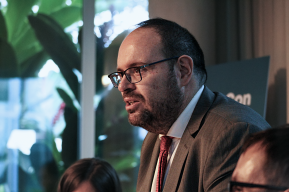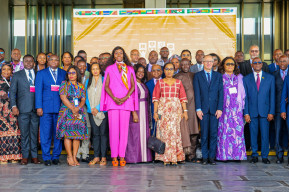News
Regional forum on Youth Employment in the Mediterranean takes stock of progress and launches digital skills initiative

Countries in the southern Mediterranean region face many challenges in political, social and economic spheres, and youth unemployment in the region is one of the highest in the world. With fast increasing rates of unemployment, beyond the COVID-19 pandemic, labour markets are undergoing drastic changes and so are the skills needs. This means that more robust systems for monitoring changes in the demand for labour and determining employers’ changing requirements for human capital and systematic arrangements for responding to emerging skills needs are required to face the challenges in the region.
The Youth Employment in the Mediterranean (YEM) project, funded by the European Union, has been collaborating with eight countries in the region from 2018 to 2021 to tackle these challenges through national and regional capacity building and collaboration.
On 8 April 2021, the UNESCO Regional Office in Beirut hosted a Regional Forum online in the framework of the YEM project, bringing together around 120 participants from the region to take stock of the results achieved; share and discuss recent developments, trends and innovative practices under each thematic area; and finally discuss the way forward.
Participants included experts in the field of skills anticipation and assessment, work-based learning, and digital and entrepreneurial skills representatives, as well as government, civil society and youth representatives from the beneficiary countries.
The meeting was by opened by moderator Mr. Salim Shehadeh, Programme Specialist at UNESCO Beirut Office, with following opening speeches by Ms. Hana Yoshimoto, Chief of Education and Senior Programme Specialist from UNESCO’s Regional Bureau for Education in the Arab States; by Ms. Iva Babic, Programme Manager at DG NEAR, European Union, and by Mr. Borhene Chakroun, Director of the Division for Policies and Lifelong Learning Systems at UNESCO Education Sector.
At the opening session the importance of the project in the region and its efforts to strengthen the collaboration across the participating countries to alleviate youth unemployment was emphasized. Even during the COVID-19 pandemic, efforts were made to continue the implementation of the project. Mr. Chakroun also highlighted the project’s alignment with the UNESCO Strategy for TVET, which this year will come to an end and create space for a renewed roadmap to strengthen technical and vocational education and training (TVET) among the Member States in the next five years.
A video with testimonies from country representatives about the impact of the YEM project and a presentation about the remaining activities until the end of July 2021 by Mr. Oussama Ghneim, YEM Project Officer, UNESCO Regional Office in Beirut, concluded the opening of the Forum.
Participants were then assigned to three breakout sessions, each going in depth with the respective thematic components. They each included presentations from country representatives, experts in the field and testimonies from youth representatives. The sessions and project components were composed of: Anticipating future skills needs - Methodologies used in YEM countries; Digital and Entrepreneurial skills in TVET; and Work Based Learning in TVET.
Digital and entrepreneurial skills acquisition in TVET programmes is crucial in today’s digital world
The breakout session on Digital and Entrepreneurial skills in TVET was also an occasion to officially launch the collaboration between UNESCO and Pix, in the framework of the YEM project. Here, Mr. Benjamin Marteau and Ms. Elsa Dufayard from Pix, France, presented the methodological approach to integrating digital skills in TVET.
As digital skills are becoming increasingly essential to access the labour market, at the end of year 2020 UNESCO began its collaboration with Pix, a French public service for assessing, developing and certifying digital skills, to support young trainees in acquiring the necessary digital competencies in the region through the YEM project. Following consultations with national representatives, Pix is conducting five interactive webinars in the beneficiary countries, during which the country representatives will be:
- Familiarized with the Pix platform, its reference framework and methodology;
- Introduced to the use of the platform in training institutions, and the development of pedagogical scenarios for digital skills development;
- Equipped to develop occupation-specific digital skills profiles;
- Solicited to provide feedback on the contents of the platform and its reference framework to contribute to its contextualization;
- Prepared to implement digital skills assessment and development campaigns in training institutions.
The collaboration is crucial to enhancing the project’s goal to mainstreaming digital skills in TVET programmes, to ensure the resilience of young people in complicated economies and increasingly digitalized job markets.
The YEM project builds on the achievements of the EU-funded NET-MED Youth project’s Employment Component. It has helped build skills anticipation models and mobilized key national stakeholders, including national institutions, youth and private sector representatives, to understand and employ the results from this exercise in service of policymaking for TVET. The project is funded by the European Union and implemented over a three-year period (2018-2020) – it has been extended to July 2021. Its aim is to support youth employment and entrepreneurship in the Mediterranean region by improving skills anticipation and TVET systems.
- YEM Regional Forum webpage
- YEM project website
- YEM Knowledge Platform
- UNESCO Regional Office in Beirut
- What UNESCO does in the field of Skills for Work and Life
Photo: MOHAMED BADDAR/Shutterstock.com








